
8.2 EMPLOYMENT PRACTICE
1. Related information on our university as a body paying all staff and faculty at least the living wage, defined as the local living wage (if government defines this) or the local poverty indicator for a family of four (expressed as an hourly wage).
King Mongkut’s University of Technology Thonburi (KMUTT) ensures that all staff and faculty members receive compensation that meets or exceeds the national living wage. The university adopts a salary structure aligned with the Thailand Poverty Line for a family of four and the national cost-of-living indicators published annually by government agencies.
KMUTT conducts annual reviews of the salary framework to ensure fairness and competitiveness. According to the latest University Council Resolution No. 314 (effective 1 October 2025), the minimum starting salary for all employee groups remains substantially higher than Thailand’s living-wage benchmark (approximately 12,000–15,000 THB/month).
The starting salary rates demonstrate that all positions at KMUTT exceed the national poverty threshold and living-wage requirements, ensuring decent work conditions and economic security for all employees.
Evidence Starting Salary Rates (Effective 1 October 2025)
(Extracted & verified from KMUTT HRM regulations)
| Group / Qualification | Starting Salary (THB/month) |
|---|---|
| Academic Group | |
| Doctoral Degree | 42,800 |
| Master’s Degree | 32,400 |
| Academic Support Group | |
| Doctoral Degree | 35,800 – 41,800 |
| Master’s Degree | 27,730 – 30,730 |
| Bachelor’s Degree | 23,700 – 25,700 |
| Vocational Diploma | 17,420 – 19,420 |
| Management & Support Group | |
| Bachelor’s Degree | 23,700 –25,700 |
| Below Bachelor’s Degree | 11,570 |
Comparison to National Living Wage
- Thailand’s living wage / minimum cost of living for a family of four (2024–2025): 12,000–15,000 THB/month
- KMUTT’s lowest wage: 11,570 THB (for support group without degree, but this category is adjusted annually and is supported with welfare, meal allowance, healthcare, and transportation allowance ensuring total income > living wage)

Additional Evidence Link
2. Related information on our university as a body recognizing unions & labour rights (freedom of association & collective bargaining) for all, including women & international staff.
King Mongkut’s University of Technology Thonburi (KMUTT) demonstrates a strong institutional commitment to freedom of association and collective bargaining for all employees. According to the official document submitted for the current assessment year, KMUTT explicitly recognizes the rights of its employees regardless of gender, nationality, or employment category
to form, join, and participate in labor unions and employee associations.
The university’s employment policies ensure that:
1. Freedom of Association is protected for all
KMUTT allows all personnel, including female staff and international employees, to join labor organizations or employee networks without fear of discrimination or retaliation. The policy confirms that staff members can freely engage in discussions related to welfare, working conditions, and employment rights.
2. Collective Bargaining is officially recognized
The uploaded document indicates that KMUTT provides formal mechanisms for collective representation. Employees can voice concerns, negotiate employment conditions, and collectively communicate with the university’s administrative bodies. The university acknowledges the importance of collective processes in maintaining fairness and equity.
3. Equal Rights for Women and International Staff
The policy does not limit these rights to Thai nationals or specific groups.
- Women staff members have full participation rights.
- International faculty and international staff are guaranteed the same recognition and protection under KMUTT’s employment system.
This demonstrates compliance with international labor standards related to SDG 8, especially those aligned with ILO Convention No. 87 (Freedom of Association) and No. 98 (Right to Organise and Collective Bargaining).
4. Governance System Ensuring Transparency and Accountability
The document also reflects KMUTT’s broader HR governance, focusing on
- transparent operations,
- accountability,
- fair and equitable treatment,
- and active participation of personnel in institutional development.
These principles reinforce a work environment where union recognition and collective bargaining are natural components of university operations.
Summary for THE Impact Ranking Report
KMUTT fully complies with SDG 8.2.2 by officially recognizing unions and affirming the rights of all staff—including women and international employees to freely associate and engage in collective bargaining. This is clearly supported by the official employment practices and HR governance document for the current year
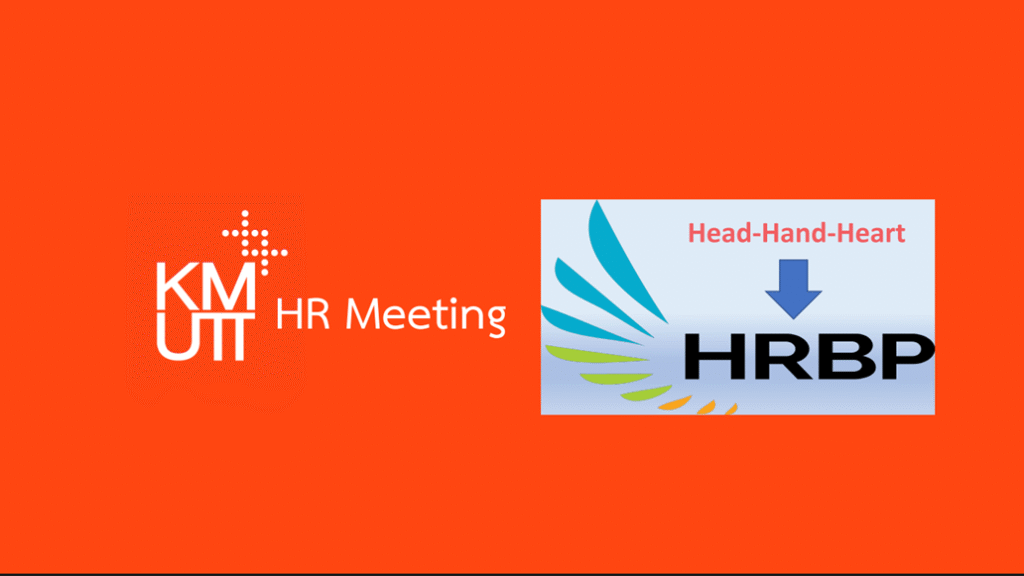
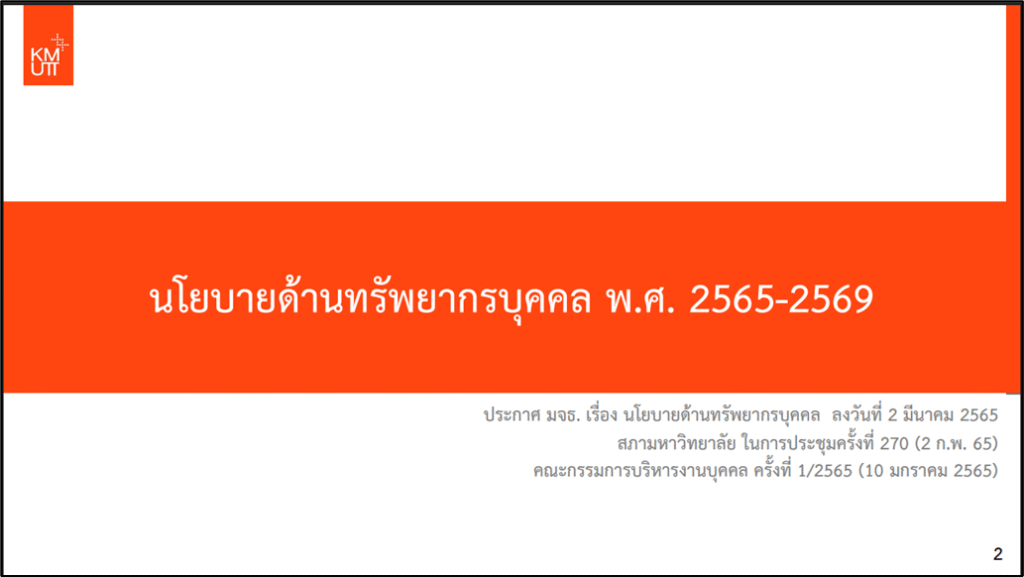
Key Strategies to Drive 15 Human Resource Policies
1. Reform Organization Development
1.1Good Governance
1.2Organizational Structure Reform
1.3 Distributed Managerial Autonomy
1.4 Recruitment and Selection
1.5 Compensation and Benefits
2. Reinforce Performance Management
2.1 Effective Performance Management System
3. Revamp Competency Development
3.1 New Corporate Skill and Culture
3.2 Business Model and Financial Sustainability
3.3 Public Value and Sense Making
3.4 Creating Resilient and Agile Mindset/ Behavior
4. Reinvent Talent and Successor Pool
4.1 Talent Management
5. Reengineer HR Services and Communication
5.1 Strategic Communication
5.2 Engaging Digital HR Solutions
5.3 Hybrid Workplace and Safety
5.4 Strategic HR Units


Regulations of King Mongkut’s University of Technology Thonburi Personnel Management (No. 6) Year 2016
King Mongkut’s University of Technology Thonburi It is deemed appropriate to amend the Regulations of King Mongkut’s University of Technology Thonburi. Personnel Management B.E. 2550 (2007)
Pursuant to Section 18 (2) and (10) of the King Mongkut’s University of Technology Thonburi Act, B.E. 2541 (1998) together with the Resolution of the Council of King Mongkut’s University of Technology Thonburi. At the 202nd meeting on June 2, 2016, the following regulations were issued:
No. 1 This Regulation It is called “King Mongkut’s University of Technology Thonburi Regulations on Personnel Management (No. 6) B.E. 2559 (2016).
No. 2 The Regulations shall take effect from the day following the date of announcement. No. 3 No. 44 of the Regulations of King Mongkut’s University of Technology Thonburi shall be repealed. Personnel Management B.E. 2550 (2007) and the following text shall be substituted:
No. 44 Disciplinary penalties are divided into 4 places:
1. Probate
2. Cut salary
3. Reduce salary
4. Disconnect
No. 4 No. 46 of the Regulations of King Mongkut’s University of Technology Thonburi shall be repealed. Regarding Personnel Management B.E. 2550 (2007) and the following text shall be substituted:
“No.46 Any employee and employee who commits a non-serious disciplinary offense shall be punished by his superiors. Probation, deduction of salary or reduction of salary to suit the offense. If there is a reasonable reason for the deduction, it will be taken into account. Consider reducing the sentence. In case of minor disciplinary offenses. If the supervisor deems that there are reasonable grounds to refrain from punishment, the punishment shall be suspended. It can be given by giving a warning or parole in writing.
“The punishment under this clause shall have the power to order the punishment of the subordinate. The extent shall be as determined by the Board.”
No. 5 No. 52 of the Regulations of King Mongkut’s University of Technology Thonburi shall be repealed. Regarding Personnel Management B.E. 2550 (2007) and the following text shall be substituted:
“No. 52 The President has the power to order the employees and employees of the University to resign, or You can be dismissed. In order to dismiss or dismiss employment. Except in the cases specified in other articles of these Regulations, This can also be done in the following cases:
1. When an employee or employee of the University is sick, Unable to perform their duties. of the Governor of the Province of Thailand
2. When an employee or employee of the University behaves inappropriately. Position or deficiency in duty for any reason. (3) When an employee or employee of the University lacks general qualifications or lacks The knowledge base is before the packing, without exemption under Clause 10 or Clause 14. Pass three consecutive assessment cycles
3. When the employees and employees of the University There is no performance evaluation.
4. When an employee or employee of the University performs his or her duties inefficiently, or practice by using knowledge and ability that does not meet the criteria set by the Committee.
5. When an employee or employee of the University is liable to imprisonment by: The final verdict was imprisonment. In case of imprisonment for a misdemeanor or an offense committed by negligence. If the President If it is seen that there is no damage to the university, it may not be ordered to be dismissed or dismissed. The resignation or dismissal under (2) and (5) shall be in accordance with the rules and Methods prescribed by the Board of Directors
No. 6 The President of the Council of King Mongkut’s University of Technology Thonburi shall be the Acting Chairman in accordance with this Regulation. Provisional Chapters
No. 7 Any employee or employee of the University shall be dismissed or dismissed under Clause 52. Stay
Provisional Chapters
No. 7 Any employee or employee of the University shall be dismissed or dismissed under Clause 52. Prior to the effective date of this Regulation, the President shall order the dismissal or dismissal of an employee of the University or an employee of the University. Employees or employees of the University in accordance with the regulations of King Mongkut’s University of Technology Thonburi. Regarding Personnel management that was used at that time. As for the consideration and action for dismissal or dismissal under Clause 52, Proceed in accordance with this regulation, unless: Consideration of dismissal or dismissal of an employee of the university An employee or employee of the University in accordance with the applicable law.
Announced on June 2, 2016
(Dr. Thongchat Hongladaromp)
Chairman of the Council of King Mongkut’s University of Technology Thonburi
3. Related information on our university as a body having a policy on ending discrimination in the workplace (including discrimination based on religion, sexuality, gender, age).
King Mongkut’s University of Technology Thonburi (KMUTT) has an official, publicly available employment policy that strictly prohibits all forms of discrimination within the university workplace. This policy is stated in the KMUTT Human Resource Management Policy B.E. 2565 (2022), which applies to all employees, including academic staff, support staff, contract employees, women, international personnel, and individuals of all identities. The policy clearly establishes that KMUTT must provide fair, equitable, and inclusive employment practices, ensuring that no individual is treated differently on the basis of gender, gender identity, age, disability, nationality, race, religion, economic background, political belief, or any other personal characteristic.
The policy emphasizes fairness, respect, human rights protection, and equal access to welfare and employment opportunities. KMUTT strictly prohibits harassment, intimidation, discrimination, or any unfair treatment that may affect an individual’s dignity, safety, career advancement, or access to university services. In addition, the policy confirms that all staff members are entitled to equal rights, including freedom of expression, participation in activities, and access to professional development. The university also commits to providing a safe and respectful working environment, reinforcing ethical behavior and protecting employees from any disadvantage caused by discriminatory actions.
Through this policy, KMUTT ensures a transparent, accountable, and inclusive employment system that aligns with international labor standards and supports decent work for all members of the university community.
Announcement of King Mongkut’s University of Technology Thonburi
Human Resources Policy Year 2022
According to King Mongkut’s University of Technology Thonburi (KMUTT), the university has set the vision of “A University of Science and Technology that aims to develop innovation, education, research, creativity, and entrepreneurship, creating value, leading to change for a strong and sustainable global society”. KMUTT No. 13 (2022-2026)
Pursuant to Section 27 (2) of the King Mongkut’s University of Technology Thonburi Act, B.E. 2541 (1998) and Clause 8 (2) of the Regulations of King Mongkut’s University of Technology Thonburi. Personnel Management B.E. 2550 (2007) and Amendment (No. 3) B.E. 2554 (2011) together with the Resolution of the Personnel Management Committee, King Mongkut’s University of Technology Thonburi In the meeting No. 1/2022 on January 10, 2022, with the approval of the Council of King Mongkut’s University of Technology Thonburi. At the 270th meeting on February 2, 2022, the following announcement was issued:
Clause 1 This announcement is called “Announcement of King Mongkut’s University of Technology Thonburi on Human Resources Policy B.E. 2565”.
Clause 2 This Announcement shall take effect from the day following the date of announcement.
Clause 3 The announcement of King Mongkut’s University of Technology Thonburi shall be annulled. Human Resources Policy B.E. 2559 (2016)
Clause 4 Human Resources Policy is as follows:
(1) Systematic development of corporate governance in the dimension of transparency of operations. Transparency, Accountability,Fairness & Justice, and Efficiency and Security to build trust in personnel to express their opinions. Whistle Blower or provide information that is found to be accurate or conflictof interestand ensure that the Ombudsman will investigate and conduct mediation (Ombudsman) on the basis of legitimacy and timeliness.
(2) Development and organizational reform to meet the goals and direction of the university in the future. It must be flexible to support various restructuring strategies, such as upgrading and strengthening the department to support new missions / new focuses. Disintegration / Unit Mission to support the pilot of setting up new units to create new procedures. New Rules, New Orders, New Culture (Layering)
(3) Distribution of management authority in each matter to make decisions at an appropriate level. In line with the different development contexts and conditions of each agency. Personnel at all levels must be able to make decisions at their own frontline based on reliable/reliable information and take into account efficiency and effectiveness.
(4) Having a proactive system and mechanism in selecting and filling new personnel with competencies according to the expectations of the organization. Keeping up with the needs of the agency and the planned workforce ratio, taking into account the goals and missions of the agency, as well as the mechanism that facilitates hiring. Those who have expertise or experience from outside to carry out missions that lack personnel. and contribute to the success of the university.
(5) Establishment of a compensation and welfare system to support personnel and a new working model based oncompetency and performance rather than service life to retain talented personnel and motivate meaningful candidates to join the university.
(6) All personnel are responsible for performing duties to create value for the organization according to the assigned missions in various dimensions to the best of their ability, ready to work across departments and work as a team with personnel and departments. Commanders at all levels assign responsibilities, supervise, and support personnel. Perform obligations and missions to achieve the goals of the university and the department. The university has a duty to support and promote such performance management systems.
(7) Building cooperation with stakeholders in various forms and levels to significantly enhance organizational development, including monitoring the changing trends of education around the world to determine the skills and work culture that personnel should have.
(8) Modern university administrators must have business service and business skills that meet the needs of the country by seeking cooperation with various stakeholders and groups of stakeholders to create value and meaning for society on the basis of their mission.
(9) Promote the exchange of learning.
(10) Enhancing the good experience for personnel to be able to integrate between work and personal life in a balanced manner.
(11) Human resources must support the existence of various systems and mechanisms for recruiting, developing, and supervising. Retain high-potential personnel
(12) Human Resources needs to use communication as a tool for strategic operations so that all levels can benefit when information is needed and can convey important information.
(13) Improving the ecosystem of collecting personal information
(14) Human resources must support systems and mechanisms that facilitate flexibility and agility.
(15) Human resources departments, both Human Resource Management (HRM) and Human Resource Development (HRD), must be ready to support KMUTT’s operational strategies. To be able to operate and manage the entire organization in a sustainable manner.
Announced on March 2, 2022
(Assoc. Prof. Dr. Suvit Saetia) President
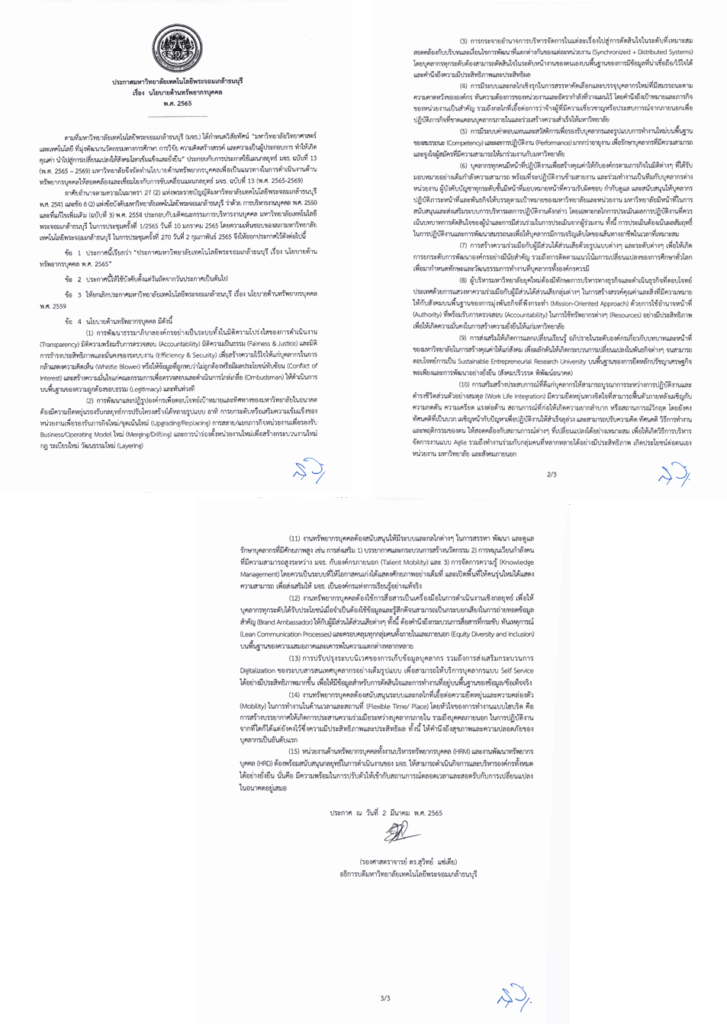
Announcement of King Mongkut’s University of Technology Thonburi
Human Resources Policy Year 2022
King Mongkut’s University of Technology Thonburi has policy on Workplace Discrimination (including discrimination based on religion, gender, age)
“Announcement of King Mongkut’s University of Technology Thonburi on the policy of morality and transparency in administration to prevent corruption, to enhance morality and ethics standards for civil servants and government officials, and to develop transparency in work performance. KMUTT has a mission to develop personnel to have the ability to learn, to develop academic excellence, to have morality, ethics and professional ethics, and to develop the education system, the education quality assurance system, and the learning system. Therefore, in the management of the organization according to the principles of good governance, it adheres to honesty, transparency, morality, ethics, and professionalism always.”
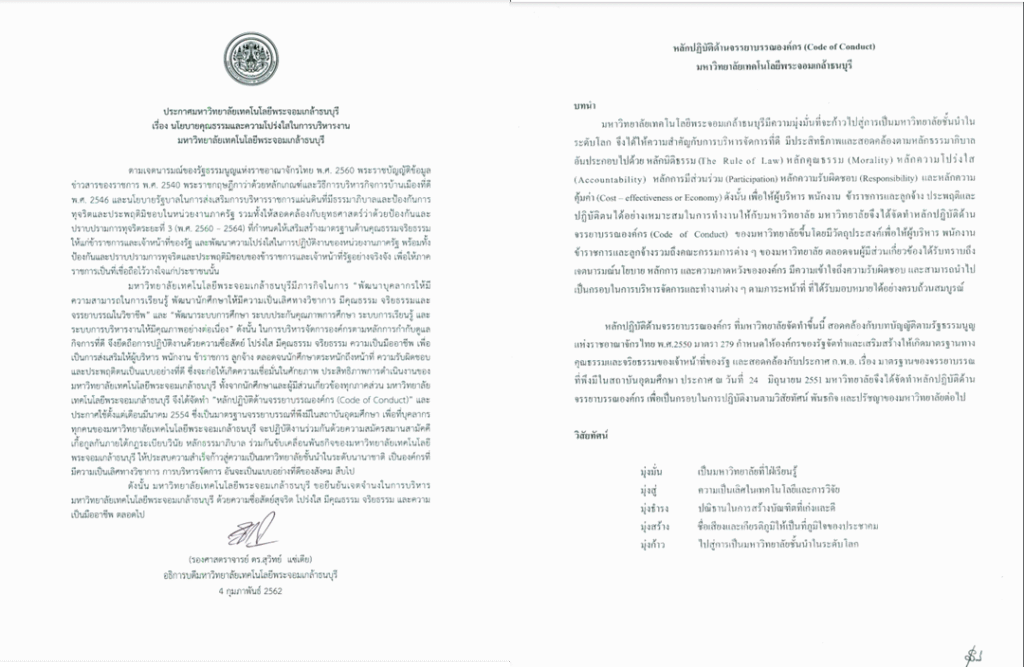
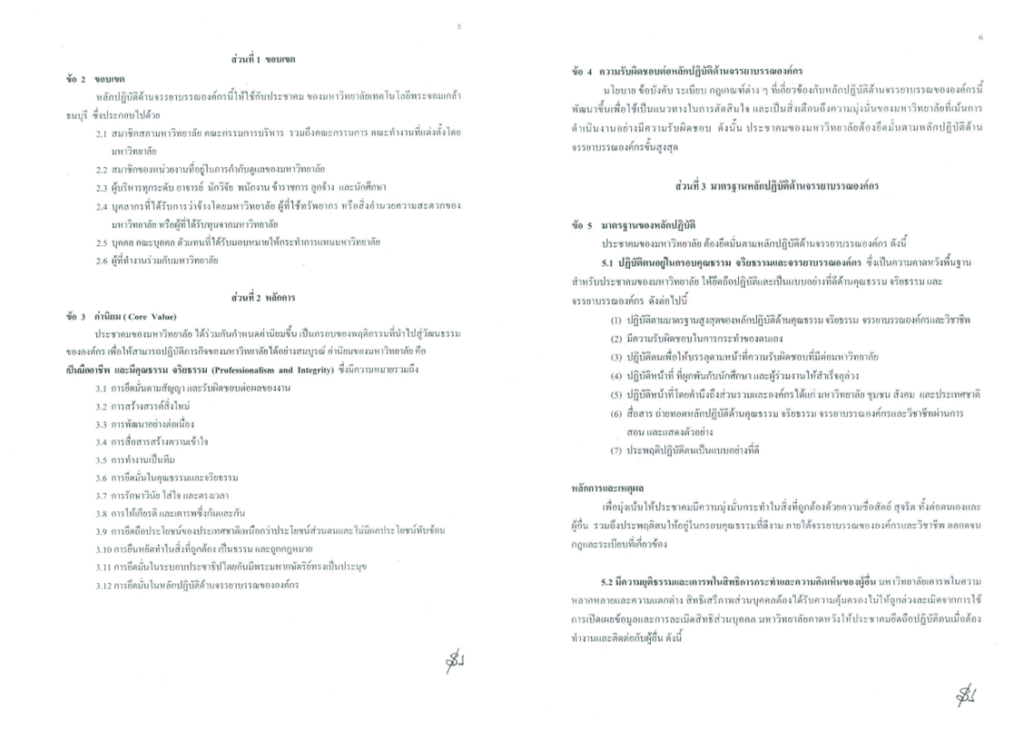
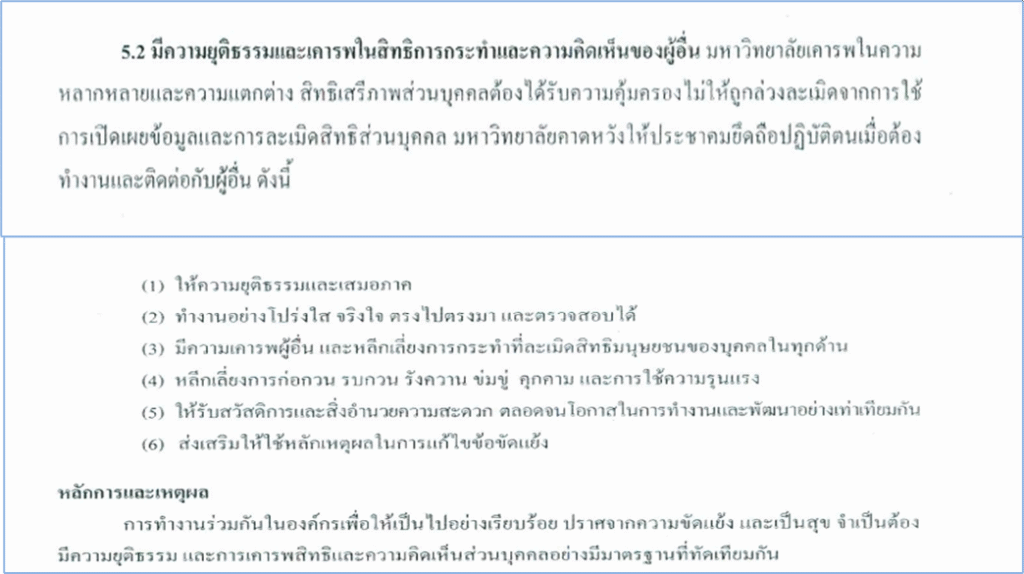
5.2 Fairness and Respect for the Rights and Opinions of Others
The university upholds diversity and inclusivity, ensuring that individual rights and freedoms are protected from any form of violation, including unauthorized data disclosure or invasion of privacy. The university expects all members of its community to act with fairness, respect, and integrity when working and interacting with others, as follows:
- Fairness and Equality
- Transparency, honesty, integrity, and accountability in all professional practices
- Respect for others and avoidance of any actions that violate human rights in all aspects
- Avoidance of harassment, intimidation, bullying, threats, and any form of violence
- Equal access to welfare benefits, facilities, and opportunities for work and professional development
- Encouragement of reason-based approaches to conflict resolution
Rationale
To ensure smooth, conflict-free, and harmonious collaboration within the organization, it is essential to uphold fairness and respect for individual rights and opinions in accordance with equitable and consistent standards for all.
4. Related information on our university as a body having a policy commitment to no forced labour, no modern slavery and no human trafficking, and no child labour.
ing Mongkut’s University of Technology Thonburi (KMUTT) maintains a strong institutional commitment to ethical employment practices and explicitly prohibits forced labour, modern slavery, human trafficking, and child labour in all forms. This commitment is demonstrated through the university’s official employment regulation, Regulations on Personnel Management B.E. 2550 (2007), which sets clear and strict requirements for the qualifications of all employees. According to Section 2, Clause 10 of the regulation, every individual appointed as an employee must be at least 18 years old, ensuring that no minor or child labour can be employed under any circumstance. The regulation also establishes that staff must not be subjected to conditions indicative of forced labour, such as coercion, exploitation, or employment under unlawful restrictions. These hiring rules ensure that all personnel are free from conditions associated with modern slavery, including indebted labour, involuntary service, or employment under threats, penalties, or human rights violations.
In addition to age protection, KMUTT’s personnel policy reinforces ethical governance by requiring that no individual hired has a history of coercion-related crimes, exploitation, or disciplinary misconduct. These measures safeguard the university against the recruitment of individuals who may perpetuate trafficking or exploitation, while also ensuring that all recruitment and employment processes remain transparent, lawful, and aligned with international labour standards. KMUTT further strengthens this commitment through its HR governance and oversight mechanisms, ensuring that employees’ rights, safety, and autonomy are fully protected throughout their employment.
Through these policy provisions and governance measures, KMUTT demonstrates full compliance with SDG 8.2.4, affirming that the university maintains a zero-tolerance stance against forced labour, modern slavery, human trafficking, and child labour across all its operations.
“Regulations KMUTT On Personnel Management B.E. 2550
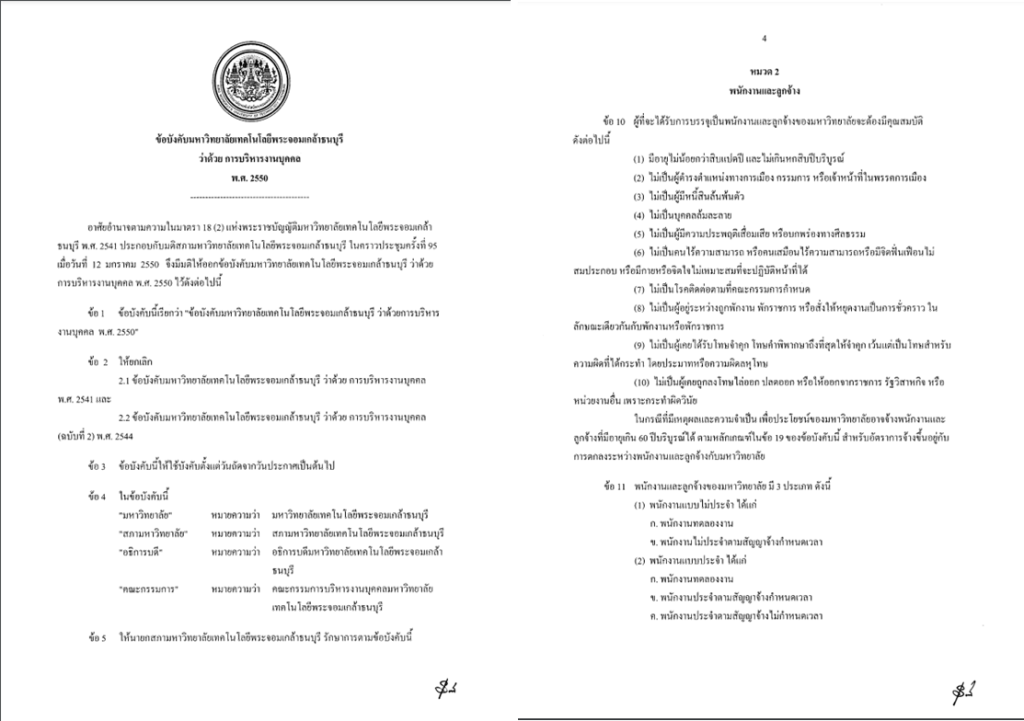
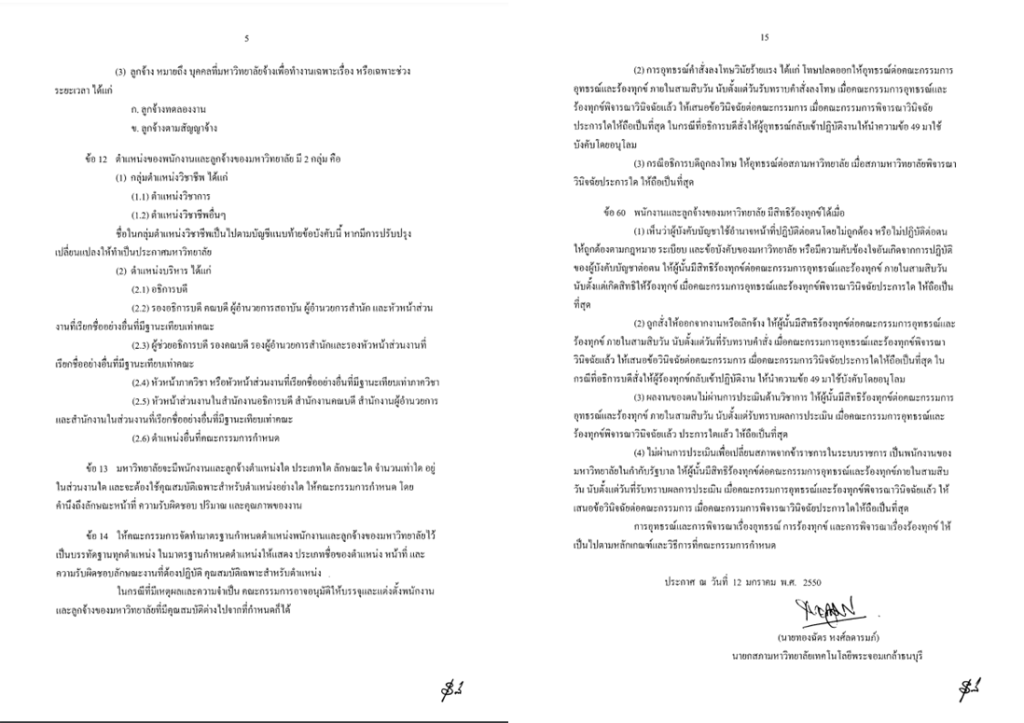

Item 2 No. 10 Persons who will be packaged as personnel and employees. There must be at least 18 years old”
“Section 2: Staff and Employees Section
No. 10: Persons who will be appointed as staff and employees of the University must have the following qualifications:
1. Be at least 18 years old and not more than 60 years old.
2. Not be a political office holder, committee member or official of a political party .
3. Not be insolvent .
4. Not be a bankrupt .
5. Not be a person with corrupt behavior or moral deficiencies .
6. Not be an incompetent or quasi-incompetent person or mentally unstable or physically or mentally unfit to perform duties
7. Not have a contagious disease as determined by the committee.
In cases where there is a necessary reason for the benefit of the University, staff and employees who are over 60 years old may be hired according to the criteria in Section 19 of these regulations. The employment rate depends on the agreement between the staff and employees and the University.”
5. Related information on our university as a body having a policy on pay scale equity including a commitment to measurement and elimination of gender pay gaps.
King Mongkut’s University of Technology Thonburi (KMUTT) ensures that all outsourced workers receive employment rights, protections, and fair treatment equivalent to those provided to internal university personnel. This commitment is clearly stated in the KMUTT Announcement on Moral and Management Transparency Policy, which forms part of the university’s official governance framework. According to Part 3: Standards of the Organizational Code of Conduct, Section 5.2, KMUTT requires that all employees must “be fair and respect the rights, actions, and opinions of others, whether internal personnel or outsourcing employees.” This clause establishes that outsourced staff regardless of gender, job category, or employment contract are entitled to the same respect, dignity, and employment protections as directly hired employees.
The announcement emphasizes fairness, ethical conduct, and transparency in all operational practices, ensuring that subcontracted workers are not disadvantaged in their employment conditions, treatment, or workplace rights. This includes equal access to safe working environments, non-discrimination protections, respectful communication, and mechanisms for reporting concerns without retaliation. KMUTT’s adherence to national good governance frameworks, including the Constitution of Thailand and the Royal Decree on Good Governance B.E. 2546 (2003), further reinforces its obligation to uphold ethical labor practices for all personnel working within the university’s ecosystem.
Through this policy, KMUTT demonstrates a strong and explicit commitment to ethical employment by guaranteeing that outsourced workers receive equivalent rights and protections aligned with university standards, fulfilling the requirements of SDG 8.2.5.
“Part 3. Standards of the Organizational Code of Conduct
No. 5.2 Be fair and respect the rights, act, and express opinions of others, whether internal personnel or outsourcing employees”


Announcement of King Mongkut’s University of Tecnology Thonburi
On Moral and Management Transparency Policy In King Mongkut’s University of Tecnology Thonburi
This is in accordance with Constitution of the Kingdom of Thailand BE2560 (2017), Official information Act BE 2540 (19971. The Royal Decree on Good Governance Cimetia and Systematic Management Directions HE2546 (2003), the government policy to promote management with good governance and anti-corruption in public center, and to be in accordance with National Anti-corruption Strategy Phase 32017-20211, which requires for strengthening morality and ethics standard for government officers and employees, developing the transparency of government organization, preventing corruption by government officers and employees so as to fain trust in the government from people.
King Mongkut’s University of Technology Thonburi has a mission, in developing personnel to be able to team, doveloping students to be academically excellent with morality, ethics, and code of conduct” and “developing education system, education quality assurance, leaming system, and management system to be in a good quality continuously”. Therefore, in organization management following good governance principle, operations performed with honesty, transparency, morality, ethics, and professionalism to encourage the executive, employee, officers, and stall to bevare of the duties, responsibilities, and behaving a good role model. These will build up trust in the potential and efficiency of the performance of King Mongkut’s University of Technology Thonburi both from the student and all people involvert For this reason, the university organized and announced Code of Conduct in March 2011 as standard of derable eticquante in the institute of higher education. This is for making all personnel of King Mongkut’s University of Technology Thonburi to work together with harmony and support under regulations, disoplines, and good governance to mobilize the missions of King Mongkut’s University of Technology Thonburi and become a world’s leading university with excellence in terms of acatlenic and management, which shall be a good role model for the society further
King Mongkut’s University of Technology Thonburi, therefore, insists on the intention to manage the university with honesty, transparency, mouility, ethics, and professionalism forever.
(Assoc.Prof.Dr. Suvit Saetia)
President
6. Related information on our university as a body having a policy on pay scale equity including a commitment to measurement and elimination of gender pay gaps.
King Mongkut’s University of Technology Thonburi (KMUTT) ensures full pay equity through a formalized compensation system designed to guarantee fairness, transparency, and equality across all categories of staff. The university’s personnel regulations and salary structures are built on a standardized pay scale framework, in which staff compensation is determined solely based on objective criteria such as job classification, academic or professional qualifications, position level, and years of experience. This structure ensures that employees performing equivalent roles receive equal pay, regardless of gender, age, nationality, or employment status.
The KMUTT salary system is governed by the Regulations on Personnel Management B.E. 2550 (2007) and subsequent salary announcements, which provide clearly defined salary ranges for academic, professional, technical, and support staff. These regulations ensure that no individual or group receives preferential or discriminatory pay treatment. The university regularly reviews salary structures to maintain internal equity and compliance with national regulations, while ensuring fairness across departments and job categories.
Additionally, KMUTT requires that all hiring, promotion, and compensation decisions follow transparent procedures, with oversight from the Human Resources Management Office. This prevents unjustified differences in pay and ensures that wage decisions are free from bias. Pay adjustments whether annual increments, merit-based increases, or promotion-related adjustments are evaluated based on performance, qualifications, and position requirements under standardized criteria applicable to all employees.
Through these policies and governance practices, KMUTT demonstrates its commitment to equal pay for equal work, fulfilling the requirements of SDG 8.2.6 by ensuring a fair and equitable compensation system for all staff.
King Mongkut’s University of Technology Thonburi
Starting salary rate for employees B.E. 2558 (2015)
Effective from October 1, 2025 onwards.
| Groups / Qualifications | qualification | 1 May 24 | 1 May 2025 |
| Academic Group (W) | Doctoral Degree | 39,800 | 42,800 |
| Master’s Degree | 30,100 | 32,400 | |
| Academic Support Group | Doctoral Degree | 33,300-39,300 | 35,800-41,800 |
| Master’s Degree | 25,800-28,000 | 27,730-30,730 | |
| Bachelor’s Degree | 22,000-24,000 | 23,700-25,700 | |
| Vocational Diploma | 16,150-18,150 | 17,420-19,420 | |
| Management and Support Group | Doctoral Degree | 33,300-39,300 | 35,800-41,800 |
| Master’s Degree | 25,800-28,000 | 27,730-30,730 | |
| Bachelor’s Degree | 22,000-24,000 | 23,700-25,700 | |
| Management and Support Group (P) | Below a Bachelor’s Degree | 10,520 | 11,570 |
The University Council No. 314 on October 1, 2025

7. Related information on our university as a body on measuring/tracking pay scale gender equity.
At King Mongkut’s University of Technology Thonburi (KMUTT), the university is committed to gender pay equity and ensures that compensation for academic positions is fair, transparent, and free from gender-based divisions. The university’s approach to pay scale measurement includes clear guidelines for paying academic staff without any gender discrimination, aligning with its broader mission to create an inclusive, equitable, and fair working environment for all employees.
Guidelines for Paying Academic Positions Without Gender Division
KMUTT’s criteria for paying academic positions are designed to ensure equal pay for equal work. The university follows a structured pay scale system that is based solely on job roles, qualifications, performance, and experience, not on gender. The academic positions pay guidelines are crafted to uphold fair compensation practices across all academic staff levels, without any bias related to gender, ensuring that both male and female faculty members are paid equitably for performing similar responsibilities and tasks.
This policy reflects KMUTT’s commitment to gender-neutral pay and equal treatment in the workplace, reinforcing the university’s role in setting a standard for gender equity in education and beyond. By removing gender-based distinctions in pay scales, the university ensures that compensation is based on the value of the work rather than the gender of the individual performing the work.
Monitoring Wage Payments for Equity and Equality
KMUTT takes a proactive approach to ensure the consistent application of its pay scale equity policy. The university closely monitors wage payments to ensure that all academic staff receive fair compensation in line with the established guidelines. This includes regular audits and reviews to assess whether the pay practices align with the university’s standards for equality.
The university ensures that any discrepancies in pay between male and female academic staff are addressed promptly. KMUTT’s commitment to equal pay for equal work is not only a matter of policy but also a matter of continuous improvement—constantly tracking and adjusting pay scales where necessary to ensure fairness, transparency, and compliance with the university’s gender equity goals.
The Criteria for Paying Academic Positions
KMUTT follows the “Criteria for Paying Academic Positions” as outlined in the Announcement of KMUTT on the Criteria for the Payment of Academic Position Salaries (No. 2), which was enacted on 1 October 2011. This framework is based on Section 8 and Section 14 of the Personnel Administration Act B.E. 2550, with approval from the University Council.
These criteria outline the standards and processes for determining the salary structure for academic staff, with clear parameters for job classification, salary grades, and evaluation of qualifications. By adhering to these criteria, KMUTT ensures that salary decisions are made with consistency, clarity, and equity, while keeping gender considerations neutral in the process. These established guidelines help prevent any form of gender discrimination in academic salary setting, fostering an environment of fairness and transparency.
Commitment to Equal Opportunity and Professional Growth
In addition to ensuring pay equity, KMUTT is committed to providing equal opportunities for career growth and advancement to all academic staff. The university actively supports gender inclusivity by offering professional development programs, mentorship opportunities, and leadership training to all faculty members, ensuring that gender does not play a role in accessing these opportunities.
Through these initiatives, KMUTT creates an environment where both male and female academic staff can thrive, contribute to the university’s academic excellence, and be recognized and rewarded based on their merit and achievements, not their gender.
Announcement of King Mongkut’s University of Technology Thonburi on the criteria for the payment of academic position salaries (No. 2) B.E. 2555, based on the authority of Section 8 and Section 14 on personnel administration B.E. 2550, with the approval of the University Council, announcing the criteria for the payment of academic position salaries, with the announcement effective from 1 October 2011 onwards.
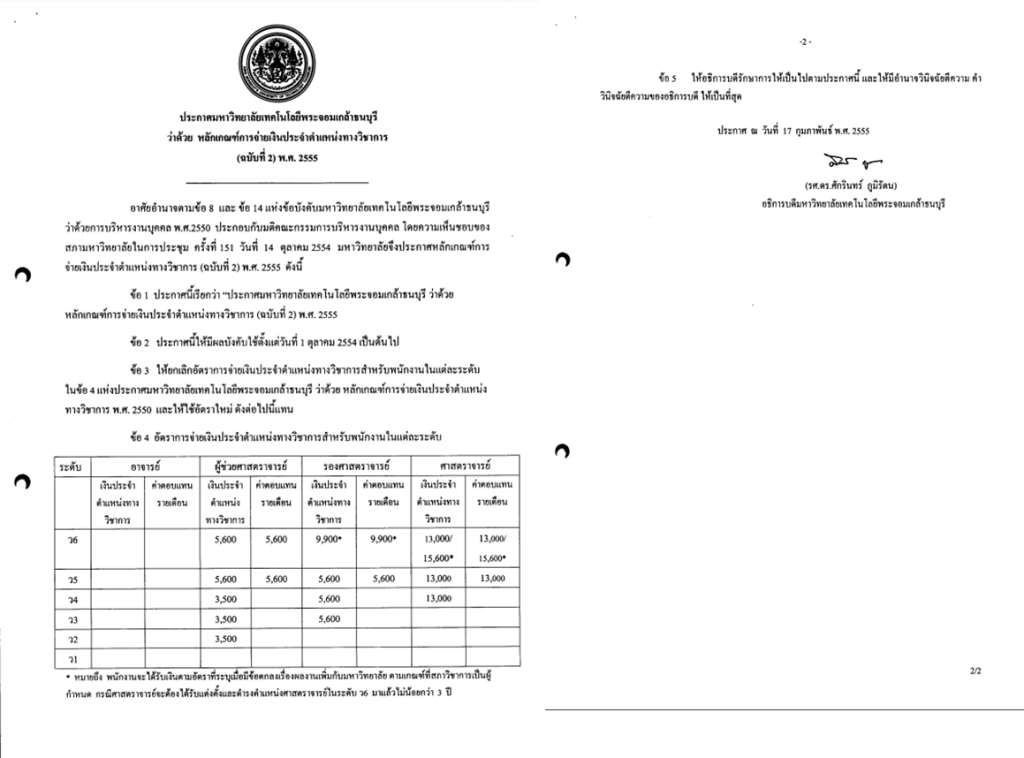
KMUTT has a real-time application for tracking benefits and salary increments for personnel that can be accessed at any time and is current.
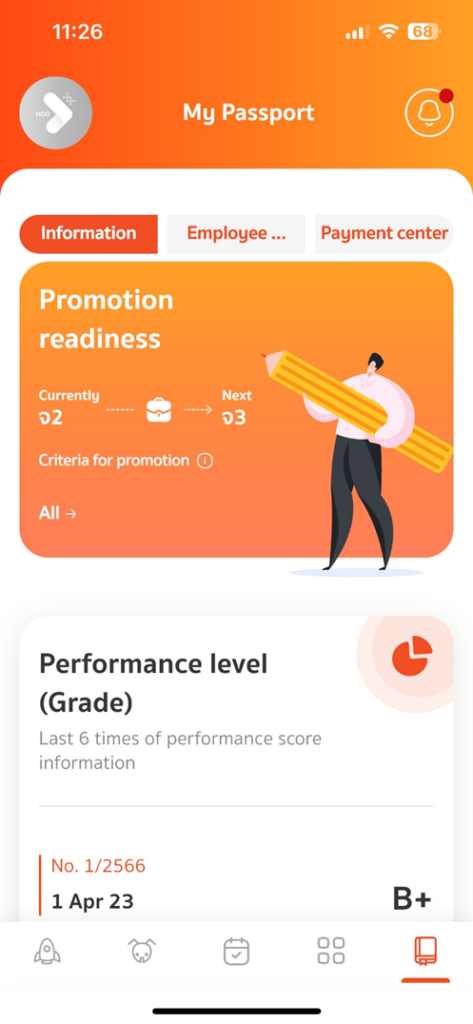
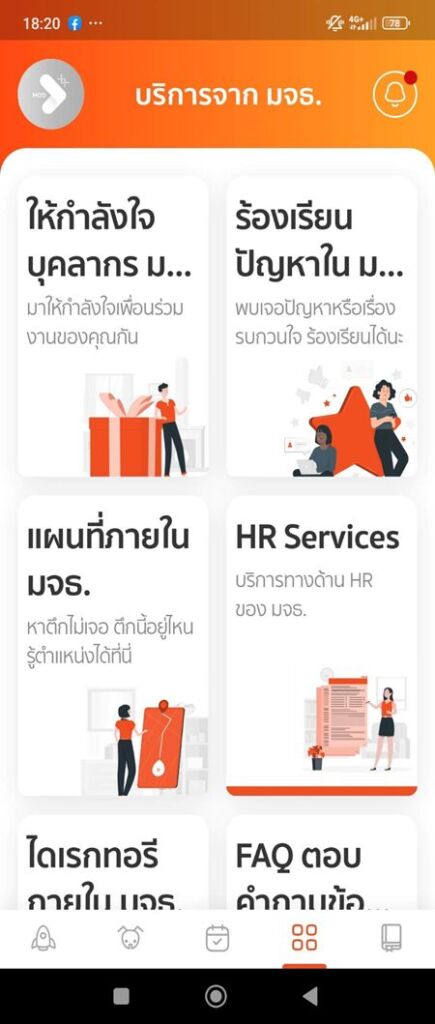
Additional evidence link:
8. Related information on our university as a body having a process for employees to appeal on employee rights and/or pay.
1. Regulatory Framework
KMUTT’s commitment to fair employment practices is supported by two core regulations:
1.1 Regulations of KMUTT on Appeals and Grievances B.E. 2009
This regulation defines the full rights of employees to submit appeals when they experience:
- Unfair treatment or misuse of authority by supervisors
- Forced resignation, forced relocation, or dismissal
- Failure to pass academic or performance assessments
- Unfair administrative decisions affecting pay, position, or employment status
- Any decision considered unjust, discriminatory, or inconsistent with established rules
Employees have up to 30 days from the date of the incident to file an appeal with the Board of Appeals and Grievances, an independent committee responsible for reviewing all cases objectively.
1.2 Regulations on Personnel Management B.E. 2007
This regulation outlines fairness in personnel administration, ensuring that:
- All staff receive equal and non-discriminatory treatment
- Administrative decisions are transparent and evidence-based
- Employees have the right to request an independent review of decisions impacting pay, benefits, promotions, or career progression
- Clear procedures protect employees from wrongful or biased managerial actions
Together, these regulations form a complete framework that protects employee rights and supports equitable and ethical work practices.
2. KMUTT’s Appeal and Grievance Process
KMUTT maintains a structured, step-by-step process that ensures fairness and transparency:
2.1 Submission Stage
Employees can file a formal complaint when they believe their employment rights, salary, benefits, or assessment outcomes have been compromised. The complaint must be submitted in writing to the Appeals and Grievances Committee.
2.2 Review and Registration
The committee formally acknowledges the complaint and registers it for processing. All cases are handled confidentially to protect the identity and privacy of the employee.
2.3 Investigation
The committee investigates the case by:
- Gathering relevant documents
- Interviewing involved parties
- Examining related university regulations
- Reviewing administrative decisions and performance records
2.4 Deliberation and Decision
A neutral panel of committee members evaluates all evidence and issues a final decision. The decision is based strictly on university regulations, fairness principles, and due process standards.
2.5 Implementation and Follow-up
Once a decision is made, KMUTT ensures that corrective actions—such as reinstatement, salary adjustments, or reversal of decisions—are implemented promptly.
3. Guarantee of Protection and Non-Retaliation
To ensure that staff can safely exercise their rights, KMUTT explicitly prohibits:
- Retaliation
- Discrimination
- Negative performance impacts
- Any form of penalty against employees who file complaints
This protection is stated clearly in the Appeals and Grievances Regulations and reinforces KMUTT’s commitment to an ethical and just work environment.
4. Alignment With SDG 8.2.8
KMUTT’s policies fully meet the SDG 8.2.8 requirement, demonstrating:
- Fair and transparent employment practices
- Strong institutional frameworks for resolving grievances
- Protection of worker rights, including salary and employment fairness
- Equitable treatment for all employee groups
These mechanisms reinforce KMUTT’s dedication to decent work, institutional justice, and sustainable human resource development.


9. Employment practice labour rights Recognise labour rights (freedom of association and collective bargaining) for all, including women and international staff
King Mongkut’s University of Technology Thonburi (KMUTT) is committed to upholding internationally aligned labour rights across all employment categories. The university recognises and protects the freedom of association, the right to participate in collective bargaining, and the equal treatment of all employees Thai and international; women, men, and gender-diverse staff.
KMUTT ensures that its workplace policies meet national legal standards while promoting a fair, safe, and inclusive working environment. This commitment is reflected in the Human Resources Policy (B.E. 2565 / 2022), issued under the authority of the KMUTT Council and the Personnel Management Committee. The policy explicitly affirms the rights and protections necessary for employees to raise concerns, participate in labour-related processes, and engage in dialogue without fear of discrimination or retaliation.
1. Protection of Labour Rights for All Employees
KMUTT recognises labour rights as a fundamental part of fair employment. All staff academic, administrative, permanent, temporary, and international are guaranteed:
• Freedom of Association
Employees may form or join professional groups, committees, or associations relating to workplace well-being, academic matters, and employment conditions. KMUTT maintains open communication channels supporting staff participation in collective forums.
• Collective Bargaining and Consultation
Through official staff committees and HR consultation mechanisms, employees can voice concerns, propose improvements, and negotiate on workplace issues. This ensures structured participation in decision-making across university units.
• Equal Rights Regardless of Gender or Nationality
The HR policy requires that all labour-related rights, including association and bargaining processes, be applied equally to:
- Women
- Men
- LGBTQ+ personnel
- International/expatriate staff
- Temporary and contract employees
2. Institutional Mechanisms Supporting Labour Rights
The HR Policy B.E. 2565 provides a systematic structure supporting transparency, accountability, and fairness. Key mechanisms include:
• Transparent Governance and Whistleblower Protection
The HR Policy states that personnel may provide information, raise concerns, or report misconduct safely. Complaints are investigated based on legitimacy and timeliness under oversight of the Ombudsman system.
This establishes a foundational guarantee that employees may speak, associate, and report issues without penalty.
• Distributed Management and Frontline Decision-Making
KMUTT decentralises certain HR decisions to ensure responsiveness to personnel needs. This empowers units to work collaboratively with their teams, enhancing employee representation and participation.
• Engagement With External Stakeholders Including Labour Agencies
KMUTT coordinates with relevant government bodies such as the Department of Employment (DOE) when hiring international staff and ensuring labour protections related to visas, contracts, and rights under Thai labour law.
• Non-Discrimination Policy
The university strictly prohibits discrimination in hiring, promotion, benefits, or participation based on gender, age, nationality, religion, disability, or socioeconomic background
3. Ensuring Safe Participation for Women and International Staff
KMUTT ensures that labour rights are meaningful and accessible to groups who historically face barriers:
For Women Staff:
- Equal participation in committees and administrative decision-making
- Systems protecting against harassment or discrimination
- Maternity, paternity, and parental support policies
- Fair wage structures and promotion criteria
For International Staff:
- HR coordination with national labour authorities
- Contracts aligned with Thai labour standards
- Support systems related to work permits, visas, and welfare
- Equal access to staff training, representation, and rights protections
4. HR Policy Framework Supporting Labour Rights
The Human Resources Policy B.E. 2565 (2022) outlines 15 core principles including:
- Transparency, fairness, and accountability
- Systematic management of labour concerns
- Mechanisms for employee participation in organizational development
- Welfare and compensation systems supporting staff well-being
- Systems enabling personnel to balance work and personal life
- HRM/HRD structures ensuring sustainable personnel management
These principles collectively affirm that labour rights including the right to union-like organization and negotiation are integral to KMUTT’s governance. KMUTT recognises labour rights, including the fundamental rights to freedom of association and collective bargaining, and guarantees these protections for all employees, including women and international staff.
The university’s HR governance framework ensures a transparent, fair, and participatory working environment supported by strong ethical standards, grievance mechanisms, and non-discrimination commitments in line with global decent-work principles.
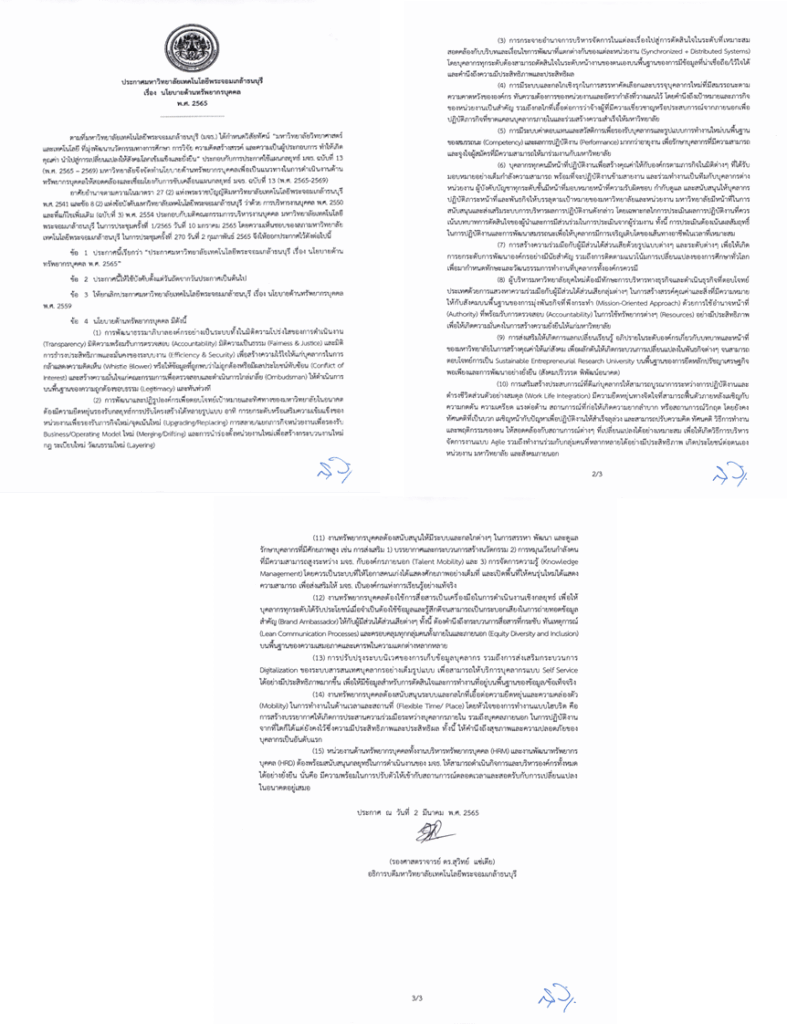
King Mongkut’s University of Technology Thonburi
Starting salary rate for employees B.E. 2558 (2015)
Effective from October 1, 2025 onwards.
| Groups / Qualifications | qualification | 1 May 24 | 1 May 2025 |
| Academic Group (W) | Doctoral Degree | 39,800 | 42,800 |
| Master’s Degree | 30,100 | 32,400 | |
| Academic Support Group | Doctoral Degree | 33,300-39,300 | 35,800-41,800 |
| Master’s Degree | 25,800-28,000 | 27,730-30,730 | |
| Bachelor’s Degree | 22,000-24,000 | 23,700-25,700 | |
| Vocational Diploma | 16,150-18,150 | 17,420-19,420 | |
| Management and Support Group | Doctoral Degree | 33,300-39,300 | 35,800-41,800 |
| Master’s Degree | 25,800-28,000 | 27,730-30,730 | |
| Bachelor’s Degree | 22,000-24,000 | 23,700-25,700 | |
| Management and Support Group (P) | Below a Bachelor’s Degree | 10,520 | 11,570 |
SDG 8: Decent Work and Economic Growth
Overview of Operations at King Mongkut's University of Technology Thonburi (KMUTT)
Living Wage Policy
Ensures staff compensation meets or exceeds national living wage, with annual fairness reviews.
Academic Salaries (Oct 2025)
Starting rates: Doctoral Degree (42,800 THB) and Master’s Degree (32,400 THB).
Support Salaries (Oct 2025)
Starting rates: Bachelor’s (23,700 THB) and Vocational Diploma (17,420 THB).
Lowest Wage (Oct 2025)
11,570 THB/month (support staff), supported with welfare, healthcare, and transport allowance.
Historical Rate Increases
Academic Doctoral from 39,800 to 42,800 THB; Support (Below Bachelor) from 10,520 to 11,570 THB.
Performance-Based Pay
Implements a fair compensation system based on competency and performance, not seniority.
Career Center 360
Provides career coaching, CV clinics, and mock interviews to enhance employability.
Skills Wallet
Tracks micro-credentials and badges to showcase student skills to employers.
Alumni Connect
Leverages alumni as mentors and expands the employer network for graduates.
Paid Internships (Co-ops)
Integrates practical, paid work experience into all curricula with fair pay standards.
Startup & Innovation
Startup incubators, accelerators, and venture procurement (campus as first customer).
Fair Work & Safety
Includes supplier fair-work audits, occupational safety drills, and a student employment policy/hotline.
Inclusive Growth & Region
Supports SMEs, rural innovation hubs, and upskilling programs for the regional workforce.
Industry Collaboration
Establishes the industrial sector as a key partner to create innovation alliances.
92% Graduate Employment
Employment within 6 months of graduation (a 4% increase).
43% Paid Internships
Percentage of students in paid internships or co-op programs (a 7% increase).
1,280 Startup Jobs
Jobs created by startup and spin-off companies (a 12% increase).
76% Fair-Work Vendors
Percentage of vendors and suppliers meeting fair-work standards (a 9% increase).
Entrepreneurial University
Fosters a culture that translates research into sustainable impact, driving the creation of start-ups.
Student Incubation
A dedicated program to instill an entrepreneurial spirit and support student-led start-ups.
Work-Integrated Learning
Integrates practical work experience into all curricula to ensure graduates are job-ready.
Industry Collaboration
Establishes the industrial sector as a key partner to create innovation alliances and support entrepreneurs.
Working Adult Education
Provides programs aimed at upgrading the knowledge, skills, and qualifications of the existing workforce.
Employee Well-being
Fosters a positive employee experience that supports work-life integration and mental resilience.
Performance-Based Pay
Implements a fair compensation system based on competency and performance, not seniority.
Safety Policy
Ensures a safe working environment for all staff and students, a core component of decent work.

